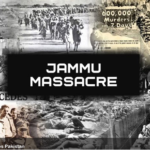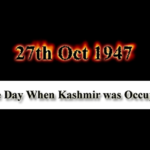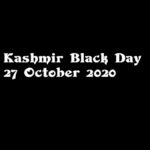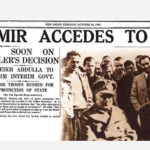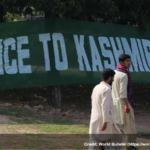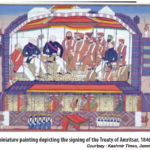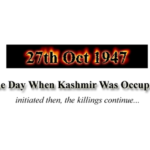That Was The Day


![]() Our resistance movement against Indian occupation is a saga of enduring horror and sorrow. There are innumerable tragic events, and one can easily find gripping and horrifying stories committed by the Indian state against innocent Kashmiri Muslims right from the day of its illegal occupation. The world has known about it, but needs to know much more than what it does. Equally, if not more importantly, the coming generations too need to know.
Our resistance movement against Indian occupation is a saga of enduring horror and sorrow. There are innumerable tragic events, and one can easily find gripping and horrifying stories committed by the Indian state against innocent Kashmiri Muslims right from the day of its illegal occupation. The world has known about it, but needs to know much more than what it does. Equally, if not more importantly, the coming generations too need to know.
At Mahazi Islami we believe that for shaping a better future we equally need to preserve our past, and honestly and objectively pass on to the future generations, those moments which simultaneously depict pain and suffering, initiative and valour, faith and hope.
‘That was the day’ is an effort in that direction. The reports that are posted here are from credible sources with explicit mention of the source, and are believed to be accurate. However, they have not been independently verified by us for their authenticity and objectivity.
Here is the ‘That Was The Day‘ catalogue:
- November 6, 2021Even after 74 years of Jammu genocide, when thousands of Muslims were massacred by mobs and paramilitaries led by the army of Dogra ruler Hari Singh, the sufferings of Kashmiris have not ended. No longer under the Dogra Raj, but the condition of the Kashmiris have only gone from bad to worse under the Indian occupation army in the illegally occupied Jammu and Kashmir.
- October 27, 2021OCTOBER 27 is the black day on which India had invaded the disputed Jammu and Kashmir state back in 1947. Alastair Lamb in his book, Incomplete Partition: The Genesis of the Kashmir Dispute 1947-1948, writes: “According to Wolpert, VP Menon returned to Delhi from Srinagar on the morning of Oct 26 with no signed Instrument of Accession.
- October 27, 2020On this day 73 years ago, Indian Security forces landed in Srinagar to illegally occupy the territory and subjugate people of Jammu and Kashmir in clear violation of international law and humanitarian norms. On 5 August 2019, India moved to alter the disputed status of Indian Illegally Occupied Jammu and Kashmir (IIOJK) and change its demographic structure. The illegal and unilateral Indian actions have been rejected by the Kashmiri people, by Pakistan, and by the international community for being in violation
- October 26, 2020The people of Jammu and Kashmir have been resisting the Indian occupation for the last 70 years. They are involved in a freedom struggle, facing the worst kind of Indian state terrorism. They have braved the Indian subjugation and atrocities with great courage and New Delhi has failed to intimidate them into submission.
- July 10, 2016What was the death toll in the killing fields of Jammu? There are no official figures, so one has to go by reports in the British press of that period. Horace Alexander’s article on 16 January 1948 in The Spectator is much quoted; he put the number killed at 200,000.
- October 24, 2014Kashmir is a source of long standing dispute between Pakistan and India, which originated when the people of Jammu and Kashmir state were denied the right of self-determination in 1947.
- March 16, 2012Our world, inhabited by the supreme creation that we call Humans, witnessed the rise and fall of many empires over its history. History has many distinctive aspects that turn it to an exceptional entity thereby letting people of all ages, colours, and tastes to oscillate about its timeline and get a line of events from diversified perspectives arriving at conclusions, though diversified in nature. That is the essence of history and its timeline is an axis of that essence. The influence of events of history do not just lock up to the walls and barricades of the time they occur in, however, it stretches across many generations of human society directly affecting their lives.
- October 25, 2010The sun rises every day from the horizon of eastern sphere of universe and uncovers the mute darkness to the serene morning of hope, dignity, self-esteem and justice for all the creatures of the world. However, on 27th Oct six decades ago, the morning as usual was serene and nurturing the life when suddenly at 9:30 it was bustled and tyrannized when illegal Indian army landed at the Srinagar (Jammu and Kashmir) airport. The mornings thereafter have not ceased to appear, they do appear as they ought to follow the universal laws but their appearances have been laden with despair, ignominy, insecurity and unjustness.
- July 13, 2010It was revolt against atrocities on July 13, 1931 when people rose against the autocratic Dogra rule and protested against the prosecution of the architect of Kashmir’s struggle, Abdul Qadeer Khan Ghazi. On the 80th anniversary of 1931 uprising, in which 21 Kashmir fell prey to bullets of Dogra soldiers, historians find similarities between the unarmed agitation and ongoing protests in the Valley.
- June 10, 2010The memories of "Syed Mansoor-Chota Bazaar mayhem" perpetrated by the Central Reserve Police Force (CRPF) personnel 18 years ago still causes a deep stir inside the hearts of the scores of bereaved families whose kiths and kins were killed in the "blood-curdling" incident.
- April 28, 2010While the world commemorates the sacrifice of a few Chicago labourers on May 3, nobody makes even a mention of the sacrifices offered by Kashmiri shawl weavers on April 29, 1865 at Zaldagar. On May 3, people across the globe commemorate the sacrifices offered by labourers at Chicago. On May 3, 1886 labourers took out a procession to press their demands. One labourer was killed when police opened fire at the demonstrators. On the following day (May 4) a protest demonstration was staged at Hay Market Square by the labourers. A bomb was hurled at the police men. Seven of them died on the spot and around 70 sustained injuries. In retaliatory action a few labourers also got killed.
- January 27, 2010Kupwara, Jan 26: Sixteen years after the massacre of 27 persons by the troops for non-observance of India's Republic Day, the residents of Kupwara on Tuesday urged that the perpetrators be brought to justice. As many as 27 persons were killed in cold blood by the troops on January 27, 1994 in Kupwara town. The latter were apparently angry over the complete strike observed by the residents a day before - on India’s Republic Day
- January 21, 2010Srinagar, Jan 20: It was the morning of January 21, 1990. The sun came up without much sparkle but it shone on young Rauf’s face for the last time. For, by noon, he was lying on the ground in his favourite blue jacket and green shoes, his body pierced by a hail of troopers’ bullets. And, two decades later, his family and those who saw him getting killed along with 52 other peaceful protesters in Kashmir’s first massacre since the armed rebellion broke out in 1989 against the Indian rule, try to look back on the event that gave birth to a generation of angry youngmen. A violent uprising and a separatist sentiment never seen before in Kashmir.
- January 6, 2010Seventeen years after the Sopur massacre, justice eludes the residents of this apple town as perpetrators of the carnage have not been punished and the case is still ‘under investigation’ with the Central Bureau of Investigation. On January 6, 1993, the paramilitary Border Security Force personnel murdered 55 civilians and torched more than 300 houses and shops in retaliation to the killing of their colleague.
- November 11, 2009Nov 14, 1973 Sher-e-Kashmir faces wrath of college eves The leaders were all set to take the Plebiscite Front to the altar for their vested interests. A deal had been finalised. People, by and large were scared of indulging in political talk. It was at this crucial juncture of Kashmir history that the students of Government College for Women did the `impossible’. Daring cane charge and tear smoke shells, the defiant students made a strong political statement on November 14, 1973. Stage was all set for naming the college after the first Prime Minister of India, Pandit Jawahar Lal Nehru on his birth anniversary.
- October 26, 200962 years ago on this day (October 27, 1947) India landed its army at Srinagar airport to occupy Kashmir. The disaster would have happened, but could have not continued, if the political foot soldiers, like the one mentioned below, had not been first cultivated by the Indian state. While narrating the events of 1947 in his autobiography ‘My Life and Times’(1992: Allied Publishers, New Delhi, India, p39)The late Syed Mir Qasim, once a puppet chief minister of Kashmir, and himself a front-ranking foot soldier, writes:

